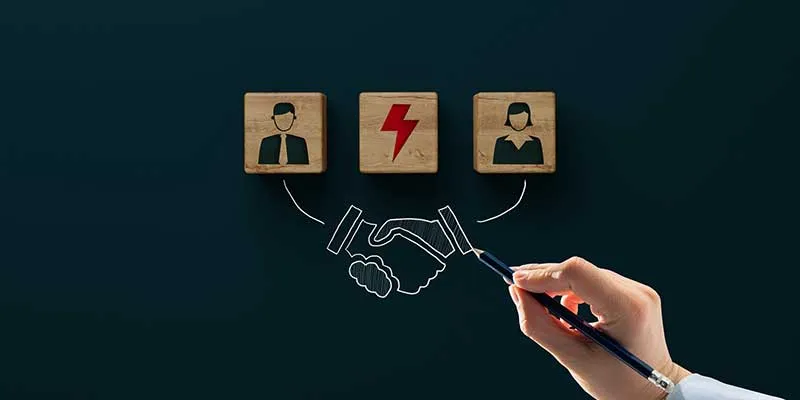4 Reasons to Work with a Mediator
How mediation can offer a more productive process for divorcing couples.
- 4 min read
- divorce
- family law

Divorces are more often contested than uncontested, and trying to work through your differences to find a solution together can seem impossible, especially when children are involved. While family law attorneys are often the automatic choice when seeking guidance, more divorcing couples are turning to an alternative solution that avoids litigation and relies on collaboration.
What is mediation?

Mediation is conducted by a professionally trained mediator who helps divorcing couples resolve disagreements and reach an amicable, mutually beneficial divorce. Instead of participating in traditional litigation before a judge, a couple meets with a divorce mediator in a private setting similar to a counselor’s office. Where a judge would reach a verdict after hearing arguments from both parties, a mediator helps a couple navigate discussions while keeping them focused on a fair outcome.
Mediation helps couples make essential decisions that can include:
- What and how assets can be divided
- Which custody arrangement is optimal
- Whether spousal support is necessary
- Who pays what amount of child support
Will I still need to work with a lawyer, too?
While it is not required, some mediators may recommend that you meet with a lawyer to finalize whatever arrangement you and your co-parent agree on in mediation. While a mediator can help you draft a divorce settlement agreement filed with the court, a lawyer may be able to better distinguish the rights and consequences that could accompany a settlement.
If you and your co-parent cannot agree with each other despite working with a mediator, your case will likely end up in litigation. Additionally, parents experiencing an especially contentious divorce may not always benefit from the mediation process. Because both people must be open and willing to work together for mediation to work, litigation may be the more suitable option for couples who cannot collaborate.
Some factors that a lawyer may be better suited to handle in navigating a divorce can include:
- Issues with domestic violence
- Criminal charges or convictions
- Child abuse or neglect concerns
- Patterns of narcissism or deceit
- Insurmountable disagreements
Why should I work with a mediator?

If your divorce is contested but not exceptionally contentious, mediation can be an excellent solution that helps you collaborate with your ex to reach a more amicable agreement. Here are 4 reasons to work with a mediator to navigate your divorce.
1. It’s a cost-effective option
The average cost of a divorce in the U.S. ranges from $15,000 to $20,000, and many other hidden costs impact how much money you can expect to spend. While the total cost of a divorce varies due to several factors, most divorce-related expenses are often attributed to the cost of working with a family law attorney. Attorneys often require a retainer in addition to hourly fees, and your expected costs can skyrocket if you get legal advice over several months.
By working outside the court system and avoiding court, legal, and attorney’s fees, the divorce mediation process offers a low-cost option for those who cannot afford a lawyer or wish to work without one. Mediation often operates on a much quicker schedule, meaning that even those who pay higher mediator fees save money due to the shorter timeline.
2. It’s collaborative, not combative
Working with lawyers in court is inherently oppositional and can increase the sense of you and your ex working against each other. As a plaintiff or a defendant, you have to present your case to a judge in a formal environment and argue that what you want is the best option for you, your ex, and your child. Once the judge delivers their verdict, either party must appeal the decision if they disagree and resume litigation.
Working with a mediator means partnering with a professional who aims to help you and your ex mutually decide on a resolution. Mediators strive to help divorcing couples review their situation, consider all options, and make decisions as neutrally as possible. Instead of approaching your divorce from opposite sides of the courtroom, mediation facilitates cooperation where parents work through a divorce from the same side of the table in a more comfortable, approachable environment.
3. It’s private and personal
Every statement and interaction is public record when divorcing couples go to court and participate in litigation. Additionally, court hearings are open to the public, meaning anyone can attend and listen to your proceedings. Your schedule also depends on your judge’s availability, meaning your case is at the mercy of the court’s schedule. Ultimately, your judge delivers their verdict based on the evidence and arguments you and your ex present. The divorce process is anything but private or personal when you go the traditional route through the court.
The only thing considered public with mediation is whatever’s included in the divorce settlement you file with the court. Unless your conversations mention information that suggests you or your ex’s well-being is at risk, any sessions with your mediator are entirely private. Mediation sessions also occur when they work for both parents, meaning your timeline takes priority over your mediator’s schedule. The decision you and your ex reach with your mediator depends entirely on your conversations during divorce mediation, meaning you have complete control over the outcome of your situation.
4. It prioritizes your children
When going through the motions in court, it’s easy for parents to focus on presenting an argument that’s better and more convincing than their soon-to-be ex’s case. There are many details to consider in a divorce, and the collective experience inevitably focuses on making the outcome benefit one parent. With issues like spousal support and custody schedules, it can be hard to stay positive and productive, which ultimately can do more harm than good for the children impacted by the divorce.
Because mediation focuses on collaborative solutions, parents can work through their divorce with a professional who helps them find the best resolution that primarily benefits their children. While a lawyer may help you win your case, a mediator will help you and your ex approach the situation with a solution-oriented mentality. Mediation helps parents communicate through their divorce, and these tips and habits can carry over into developing a healthier co-parenting relationship.
How TalkingParents can help

Mediation is a great tool that helps parents navigate divorce. For parents who want to build on the foundation they create with a mediator, a co-parenting communication service can help. With TalkingParents, parents have a tool to help keep conversations civil, accountable, and productive. Every message and call transcript is documented in an Unalterable Record that serves as a single source of truth. If you go to court or seek additional mediation, your Records qualify as court-admissible evidence that can help save time and money with an attorney or mediator.